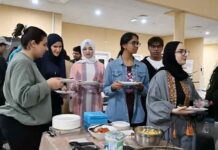Journalism student Abeer Khan reports on the Lohar blacksmiths community in India.
BHOPAL, INDIA – Blacksmiths from the Lohar community are still facing a decrease in sales due to the March 2020 Covid-19 pandemic lockdown.
The blacksmiths have lived in roadside clusters along the Govind Pura industrial area for over two decades. Their residential huts were also where they make and sell iron implements.
Entire families contributed to the business process. Women, young girls and children helped by hitting and shaping iron bricks and sheets. The men shaped and sharpened weapons.
During the lockdown, they faced problems procuring money for basic expenses.
“There were no customers [during the lockdown]. It was a difficult time,” said one of the blacksmiths. “We are still recovering,” she added.
Even after the lockdown was lifted, business remained slow as patrons practiced social distancing. Male members of the families had to travel to farther places to sell the objects and bring money back home.
The blacksmiths were popular among butchers and farmers for selling products such as machetes, kitchen knives, axes, grass-cutters, and farm equipment.
The Lohar community consists of nomadic blacksmiths, who do not usually send their children to school. However, they train their children to become professional blacksmiths.

















